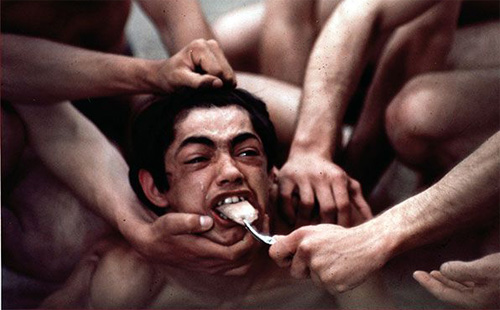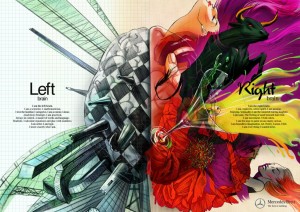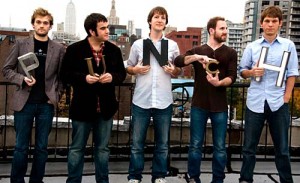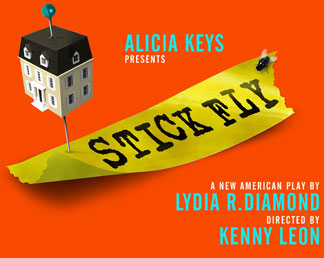I thought this might be a good place to do a round-up of the controversy surrounding the TheaterWorks casting of Stephen Adly Guirgis's The Motherfucker with the Hat, which we talked about in class. After the (lengthy) laying out of facts here in part I, I'll try to get into the meat of the matter in a second post.
Let's start with Guirgis' first public salvo on Facebook. He wrote the following, and it was reposted widely by playwrights and other sympathetic theatre folk:
"IN HARTFORD CONNECTICUT, THE MAYOR IS PUERTO RICAN. BUT IN THEATERWORKS PRODUCTION OF MY PLAY IN HARTFORD -- THE 2 LEAD PUERTO RICAN CHARACTERS ARE PLAYED BY WHITE ACTORS. THE PLAY WAS CAST IN NYC & CONN, AND IF YOU LOOK AT THE BREAKDOWN HERE, YOU WILL SEE THAT NOT ONLY DID THEY NOT CAST LATINOS, THEY DIDN'T EVEN SEEK LATINOS FOR THE 2 LATINO LEADS!!! IF THIS DISTURBS YOU, PLEASE REPOST. NOTHING AGAINST THE ACTORS CAST, BUT THIS IS INDEFENSIBLE BULLSHIT. PLEASE SHARE MY HEADSHAKING ANGER. THANKS! STEPHEN"
He linked to the casting breakdown posted by the theatre. See it here.
Then the media started catching wind, and the first few sum-ups appeared within hours (I think NYC's ReMezcala got it first).
From what I can gather, it seems that HOLA, the Hispanic Organizaiton of Latin Actors, was the first one to draw Guirgis' attention to the casting disparity after they reached out to TheaterWorks with concerns. (A reminder that Hartford has a gigantic Puerto Rican population, so the omission of Latino actors in these roles is all the more strange.)
Guirgis followed up with a more detailed public note on his facebook page. Here's an excerpt:
"I believe firmly in casting the best actors for the roles, but when you write a play about two characters who are of a certain age and ethnicity -- and it is cast in NYC -- it is not unreasonable to expect that the actors who get cast will match up fairly squarely with what you wrote and intended. When HOLA sent me the response they had received from Theaterworks about the casting situation, I was immediately struck by the dismissive tone, the blame shifting, the denial, and quite frankly, the outright lies that Theaterworks response contained. And then I saw Theaterworks' character breakdowns for the roles that went out for the auditions, and there was no mention of the ethnicity of the two characters in question. It became clear to me that perhaps Theaterworks had no intention of casting Latinos in the first place since they weren't asking agents to submit Latino actors for these Latino roles. I then began my own dialogue with Theaterworks. The director quickly admitted that his actions were "indefensible", but Theaterworks itself continued to refuse any accountability or responsibility for the situation, and after several attempts at productive discourse, I came to the unfortunate conclusion that Theaterworks would never cop to any responsibility and that they seemed to be clinging to some logic-challenged notion of; "If we don't admit fault, then there is no fault". I am sincerely grateful to Theaterwoks for having produced my play, but my gratitude does not extend to sitting silently while nonsense like this happens."
In the comments to the note, some wondered how a director like Tazewell Thompson, African-American and generally practiced at working on new plays (and thus, with the needs of playwrights) could have stumbled so deliberately around issues of ethnicity and script integrity. Guirgis jumped back in with the following:
"unfortunately, and i do mean this sincerely, the truth is tazewell WROTE the breakdown. not the casting people. and he hired EXACTLY who he wanted to hire, and the theater backed him up. not only that, he pre-cast those 2 actors. straight offers to 2 actors who were a decade too young and non-latino and his former students. they did not even SEE latin actors for those 2 roles in the NYC auditions. not even a PEEK at a whole bunch of actors who fit the bill to be seen for those parts. so, you gonna have to ask tazewell what he was thinking about. i wish i could say i knew. the theater is squarely at fault for approving it, and then refusing to accept accountability, but the rest, i'm sorry, but that's on the director. he admitted it hiself in his email to me -- which was admirable, but, if you mess up that bad, you SHOULD admit it...and the one latino who did get cast, you don't want to know what he was asked to explain & talk about to the two white actors on the first day of rehearsal -- at the director's request. i wish i could tell you something different about all this."
The New York Times covered the scandale on its ArtsBeat Blog, here. Of interest to me is this particular bit of an interview with Steve Campo, the Executive Director of TheaterWorks:
"Mr. Campo said the decision not to specify any ethnicity for actors to play Jackie and Veronica was made by Mr. Thompson and the theater’s casting director, Pat McCorkle. TheaterWorks did cast a Puerto Rican actor (Varin Ayala) in the role of Cousin Julio; the casting call breakdown did specify that character was Puerto Rican.'I know they deliberated hard on the casting breakdown language and on the casting decisions,' Mr. Campo said." (Bold face type added by me for emphasis.)
This touched off another salvo from HOLA, who made contact with said casting director -- she is rightfully dismayed at being lumped into this mess. An excerpt from HOLA's press release:
"In her statement to HOLA, McCorkle states, 'The entire casting breakdown was written by Tazewell Thompson along with Theaterworks Hartford without our involvement. I was in no way involved in writing the breakdown for The Motherf**ker with the Hat, and no actors were seen for the roles of ‘Veronica’ or ‘Jackie’ in our New York auditions. Offers had been made by the theatre prior to our appointment auditions. At the director’s request, we saw one actor for the role of 'Ralph’, even though the role was pre-cast with Royce Johnson. Other than that, we only saw candidates for the roles of ‘Victoria’ and ‘Cousin Julio’. I have gone through all of my notes, all of my session sheets, and all of my availabilities, and I am 100% certain that all of the information that I have given you is accurate.' McCorkle goes on to state, 'I am very disappointed that my name was included in the New York Times article as I had no participation in the casting of ‘Jackie’ or ‘Veronica’.... the final decision on all the actors comes from the director and the theater.' In addition, McCorkle states,'This situation has disappointed me greatly, because in my thirty plus years of casting, I have built my name and prided myself on my integrity and my belief that the playwright’s vision comes first.' HOLA is gratified at the casting director’s clarification of the casting procedures employed on this production and, further, at her support of HOLA’s efforts to advocate on behalf of the Latino acting community."
{I haven't been able to find a web-hosted version of that press-release; I received it by email. In the interest of good sourcing, I've made some screen shots of it so you can see it in its entirety here.}
In the meantime, Campo has responded in two parts:
"It is a tribute to his skill that Stephen Adly Guirgis, though not Hispanic, is able to so credibly depict a culture not his own, as he does in "The Motherf[------] With the Hat". How gracious it would be of him to allow that actors (of whatever heritage) might succeed in acting, much as he has in writing."
AND
"To All:
Please know...
-I can't think of a play I love more than 'The Motherf[-----] With the Hat;'
-there is no theater artist in whom I have more trust that Tazewell Thompson;
-Taz had a nightmarishly tiny window in which to put together TheaterWorks' cast for 'The Motherf[-----] With the Hat;'
-among those who auditioned, I have no doubt that Taz cast the very best actors available;
-in the future TheaterWorks will certainly seek and take advantage of all available resources to more effectively reach out to Latino theater artists, especially when obviously appropriate roles are available;
-I genuinely regret the pain this situation has caused, but rejoice in having had the opportunity to bring a wondrous play to our community;
Sincerely,
Steve Campo"
... Guirgis has responded to Campo's statement in the comments section of BroadwayWorld.com:
"it's interesting that mr. campo calls me out for not being latino. it's interesting that he categorizes me as being ungracious. I am a half-egyptian, half irish-american new yorker who wrote a play about new yorkers who are multi-ethnic, and yes, three of those characters are latino. I will be at the theater in hartford to support the actors & to see the show. I'm sure all the actors have worked hard and have given their all, and I look forward to meeting them afterwards and giving them some love. it will also be interesting to see if I will see mr campo there. perhaps he can teach me more about how to be gracious, and he can school me on all the other ethnicities that I am not a member of. I will say this: if mr campo can give me the list of every latino actor in nyc that they saw for the roles of jackie & veronica before they decided that these two caucasian actors were far and away the best choice, then I will be happy to make a sincere & formal apology to him, along with a financial donation to his theater. I have already lost FRIENDS over this -- people who just assumed I knew what was going on from the beginning and did nothing to stop it. perhaps mr. campo could also teach me how to repair those relationships. I look forward to meeting mr campo someday so I can fully express my gratitude to him face to face. I'm sure I have much to learn from him about many things."
-------------
Come back for Part II of this post, where I'll try and unpack some of this.
-------------
As a side note, there are rumblings afoot in online fora about a production of Much Ado About Nothing directed by Ethan McSweeny at The Shakespeare Theatre in DC (headed by Michael Kahn). This version is set on a Cuban sugar plantation in the 1930s. A week or so ago, there were reports of an incredibly last-minute withdrawal from the cast over "artistic differences." These "differences" have not been detailed by the theatre or by the departing Veanne Cox (who had been about to open as Beatrice!), but some are hearing warning bells when they look at the setting and the cast list (click here, then choose the tab called "Artists") -- specifically the characters who've been renamed Juan Arroz and Jose Frijoles. Who knows what the story is here, but I'm staying tuned.

 Yesterday I saw "The Lie of the Mind" and I had no idea what the show was about. I opened the program and one of the notes was about Post-Traumatic Stress Disorder and I was so interested because we are studying mood and personality disorders in my psych class these past few weeks and we just talked about Post-Traumatic Stress Disorder. It was so so so so interesting to be learning very statistically about the disorder and then to see it dealt with on stage. The way that the actors dealt with the disorder really helped me get a glimpse into the mind of someone with the disorder and what it was really like for those around them to deal with. It was also so interesting to think about that point of view from a playwrights point of view and the bravery to write about a disease that way and to decide to tackle it like that. Also the real research and preparation involved to prepare a character and a world like that. There was a very specific moment with Ian Greers that made everything click and I of course I can't remember now but it jumpstarted my discoveries throughout the entire piece.
Yesterday I saw "The Lie of the Mind" and I had no idea what the show was about. I opened the program and one of the notes was about Post-Traumatic Stress Disorder and I was so interested because we are studying mood and personality disorders in my psych class these past few weeks and we just talked about Post-Traumatic Stress Disorder. It was so so so so interesting to be learning very statistically about the disorder and then to see it dealt with on stage. The way that the actors dealt with the disorder really helped me get a glimpse into the mind of someone with the disorder and what it was really like for those around them to deal with. It was also so interesting to think about that point of view from a playwrights point of view and the bravery to write about a disease that way and to decide to tackle it like that. Also the real research and preparation involved to prepare a character and a world like that. There was a very specific moment with Ian Greers that made everything click and I of course I can't remember now but it jumpstarted my discoveries throughout the entire piece.

 So the day before Thanksgiving, Chloe and I saw Other Desert Cities and the day after we saw the genius Kenny Leon production of the genius Lydia Diamond play Stick Fly. Those of us in the SOT community have been privy to the evolvement and progression of this play, but it was truly something else to see it on the Great White Way. Droves of people (who don't know Lydia) were there to support this play they know little to nothing about. If it is Alicia Keys that gets them there, then who am I to poo-poo on that because, at the end of the day, IT GETS THEM THERE. I can't ever argue with having huge names in important shows because it does the job it's meant to do. If only more celebrities or notables would invest their time in WORTHWHILE productions, then there would be no need to scoff.
So the day before Thanksgiving, Chloe and I saw Other Desert Cities and the day after we saw the genius Kenny Leon production of the genius Lydia Diamond play Stick Fly. Those of us in the SOT community have been privy to the evolvement and progression of this play, but it was truly something else to see it on the Great White Way. Droves of people (who don't know Lydia) were there to support this play they know little to nothing about. If it is Alicia Keys that gets them there, then who am I to poo-poo on that because, at the end of the day, IT GETS THEM THERE. I can't ever argue with having huge names in important shows because it does the job it's meant to do. If only more celebrities or notables would invest their time in WORTHWHILE productions, then there would be no need to scoff.